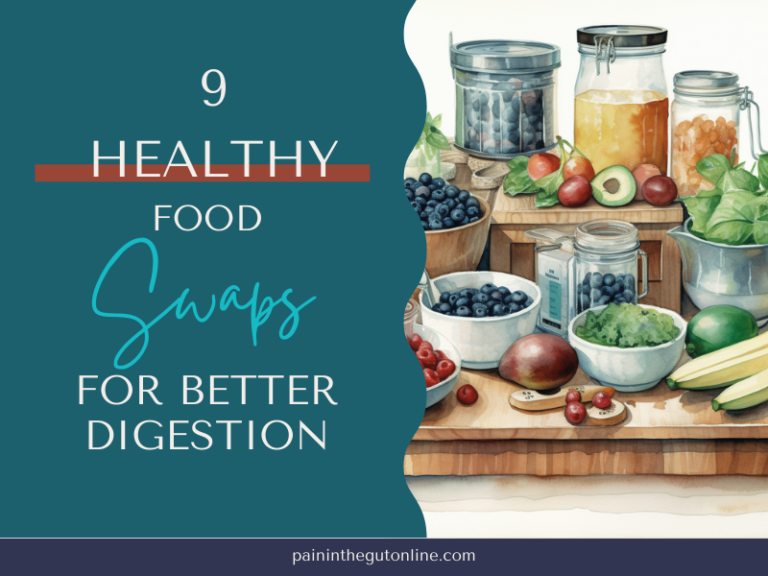CAN’T IGNORE DIGESTION
9 min. read/ 1524 words
Recurring digestive unrest may signal your gut is crying out for help. Here are five reasons you can’t ignore indigestion for even one more day.

It’s easy to dismiss indigestion. Chalk it up to a heavy meal or blame how the food was prepared. How often have you told yourself it’s because you have trouble with garlic(or insert whichever food here)? If you took a moment to think about how many times you have had indigestion in the past week, would you be surprised by the frequency? Has it become a regular thing with you without you even realizing it?
I’m telling you, you can’t ignore indigestion!
For years, I suffered from digestive problems. I became the person who everyone knew to be ill after eating a meal.
My sister liked to say I had a “sensitive tummy, poor thing.” she also liked to point out how she could eat anything, including that potato salad that’s been sitting on the counter for 5 hours without ever experiencing even a little gas.
Well, good for you, sis!
And thanks for making me feel weak and pathetic. Also, why would you ever eat anything that sat out on the counter for 5 hours, dummy, are you trying to get a foodborne illness?
Seriously though, my digestive issues had gotten out of hand.
It started slowly. I would notice my pants felt tight after eating, even small meals, and it would take a long time for that overwhelming feeling to ease up. Even though it started slowly, over a few years; eventually, indigestion became a regular thing for me.
At my worst, within 10 minutes of eating(sometimes even while I was still chewing), my stomach would bloat up significantly, and the sweats and stomach cramps would begin. I got to where I was eating very little and only when I couldn’t stand the hunger pangs any longer. Not eating was better than suffering the consequences of doing so.
I spent years suffering!
If I had just paid attention to what my body, my gut, was trying to tell me 10-15 years ago, I could have avoided all those embarrassing trips to the single-stall bathroom at work and the hours spent curled in a ball on the couch praying the trapped gas would just come out already.
The signs were all there. It was like my gut was screaming for help in a language I didn’t understand. And because I disregarded the symptoms I was having, things ended up getting even worse.
Gut issues don’t just go away on their own, trust me. Your gut can’t heal itself without your help.
Don’t make the same mistake I made. Don’t sit by and tell yourself it will work itself out because it won’t. Here are 5 Reasons You Can’t Ignore Indigestion, especially if you already have symptoms.
Table of Contents
5 Reasons You Can’t Ignore Indigestion, Ever!
So, when you hear the word indigestion, what symptoms come to mind?
Gas, cramping, and diarrhea?
Well, yeah, those are some of them for sure.
What about bloating or that overfull feeling?
Excessive and long-lasting burping(I’m talking hours of burping, not that 30-second burp your cousin used to recite the alphabet)?
How about nausea, acid reflux, heartburn, headache, and fatigue?
You can read more about the signs that your gut needs help here.
Maybe you haven’t given it much thought. Maybe you’ve told yourself the same lies I did for years. It was just this one meal; it was probably prepared badly, or you can’t eat the same foods you used to because it’s all part of getting older.
That’s a load of crap. Literally and figuratively.
Stop lying to yourself. It’s not doing you any good; it’s doing your body more harm than you may even realize. Say it with me; you can’t ignore indigestion or make excuses for it.
5 Reasons You Should Listen to Your Gut:
- Chronic digestive issues could be a sign of a serious medical condition.
- Quality of life.
- Long-term damage can lead to more serious problems.
- The immune system may become compromised.
- Lacking proper nutrition is a problem because your body can’t absorb nutrients from your food.
Chronic Indigestion could be a sign of a serious medical condition. Diseases such as diabetes, Crohn’s disease, Irritable Bowel Syndrome, and obesity have all been associated with poor gut health. When experiencing recurring and frequent digestive problems, you should always consult your doctor to rule out a more serious condition.
Quality of life. Digestive issues can really affect your happiness and hinder your daily life. Putting up with chronic indigestion is no way to live. You should be able to live a life free from worrying about how your body is going to react to your next meal—a life that you can enjoy.
Long Term Damage. Chronic digestive unrest can lead to more serious medical issues when left untreated. For example, if you have undiagnosed Crohn’s disease and continue eating wheat, you can cause permanent damage to your intestines, which can even lead to colon cancer. Type 2 Diabetes can wreak havoc on many different systems throughout your body, causing nerve damage, loss of eyesight, kidney failure, and more.
Compromised Immune System. 70% of your immune system is in your gut. When the bacteria in your gut are unbalanced, your immune system may attack your cells. An overworked immune system can cause you to get sick more often and make it harder for your body to recover from illnesses.
Lacking Proper Nutrition. A condition known as Leaky Gut occurs when the lining of your small intestine gets damaged from eating certain foods you are eating. As a result, undigested food particles, food waste, and bacteria can leak through your intestinal wall and into your bloodstream. When your immune system sees these substances, it reacts with an autoimmune response, which can cause inflammation, headaches, irritable bowel syndrome, skin conditions, fatigue, food allergies or intolerances, and more.
Read more about gut health here.
Now That You Know, What’s Next?
Knowing is half the battle. But if you regularly experience indigestion, what should you do about it?
For good measure, one more time, you can’t ignore indigestion because it won’t just go away on its own.
My first suggestion is to talk to your doctor. It’s always a good idea to rule out anything major before fixing things yourself. Once you get the go-ahead, you can make lifestyle and dietary changes. As always, I highly recommend a natural approach to healing your gut by changing the foods you eat and taking time to take care of yourself.
Determining which foods trigger your digestive symptoms is one way to begin your journey to a healthier gut. This can be done in two ways:
- Take a food sensitivity test
- Try an elimination diet
A food sensitivity test will give you results quickly.
You can buy a food sensitivity test online for about $159 through EverlyWell. They get you the results within 5 days and check for 96 different foods. They also offer a more comprehensive test that checks for 205 foods for $259. You can learn more about their tests here.
An elimination diet involves eliminating all possible trigger foods for a while, usually a week, and slowly adding the foods back into your diet one by one. You keep a food diary and track your body’s reaction to certain foods as you reintroduce them. While this method takes some time, usually a month or more, it doesn’t cost you anything more than the price of the food you eat.
You’ll have to determine which method you would like to use. While I know it can be tempting to skip this step, don’t. This step is crucial to your success in this journey to a healthier gut and a life free from indigestion.
I know which foods to avoid, so what do I eat now?
Once you have a list of foods you need to avoid eating, it’s time to make a meal plan and stick to it.
This step can be the most challenging for some, and you may feel overwhelmed by it. Don’t worry, we got you. Join our email newsletter for weekly gut health tips, recipes, and the latest news. Thank you for subscribing, you will receive our Beginner’s Guide to Gut Health as a FREE gift!
Click here to visit our store, learn more about the guide, and grab your FREE copy now!
Disclaimer
This article does not diagnose, treat, prevent, or cure any illness or disease. The information provided in this article is for general educational purposes, has not been reviewed nor approved by the FDA, and is not intended to take the place of advice from your medical professional, licensed dietitian, or nutritionist. It’s always a good idea to rule out anything major before changing your habits or diet to improve your gut health. Share your symptoms with your doctor so they can help you rule out a major illness. You are solely responsible for your health care and activity choices. Participation does not constitute a client-coach relationship.






